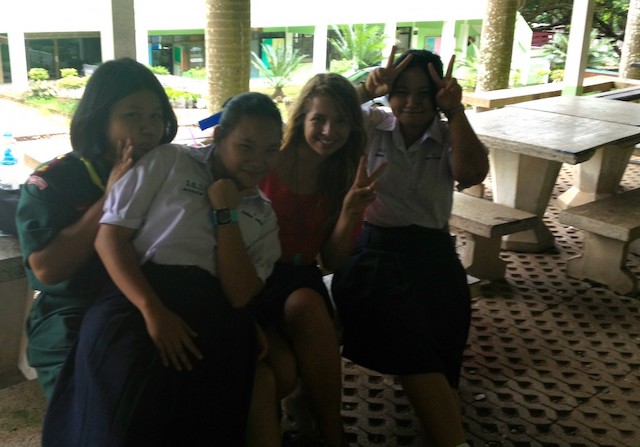Living in Thailand and Feeling The Best Kind of Tired


Thailand has been my home for almost two months now. I live and work here as an English teacher at a secondary school in the small town of Wang Chan, Rayong, about three hours east of Bangkok. Each week, I’m responsible for teaching English conversation to nineteen classes – that is, nearly eight hundred students. Unsurprisingly, I felt immediately overwhelmed when I discovered this detail of my job. To be honest, even after a half-dozen fairly successful weeks in the classroom, the idea still kind of overwhelms me.
I begin my days at 7:40, when I clock into school using my thumbprint and walk across the street to the drink stall where I buy a large Thai iced coffee every morning. The caffeine punch hardly compares to the full-bodied roasts I used to drink, but the sugar kick from generous spoonfuls of sweetened condensed milk almost makes up for it.
I make my way back to school and upstairs to my third-floor office, where I have a half-hour or so to prep for the day while students are occupied at the morning assembly. My first class starts at 8:30, and from there the school day passes quickly and routinely.
Uniformed students rise to greet me at the beginning of every class, and at the end they stand to thank me.
Uniformed students rise to greet me at the beginning of every class, and at the end they stand to thank me. With the chalkboard as my stage, I perform lessons ranging from describing people’s physical traits (here, I win over my audience using pictures of such loved celebrities as Justin Bieber and Taylor Swift) to distinguishing between adjectives ending in -ed and -ing (teen pop stars are less useful here).
Almost without exception, my lessons culminate in games: Thai students love to have fun (sanook is a staple of Thai culture), and they especially love competition. I teach four classes each day, using my free periods to do write-ups on each class and prep lesson plans for the upcoming week.
Believe me: this is hard work.
Believe me: this is hard work. To look into a room of predominantly disinterested faces and engage them with English vocabulary, to prowl the aisles and make sure students are taking notes and staying on task, to speak so loudly over a class of fifty chatty students as to lose your voice every other day–to do all this, and when you speak only the faintest trace of Thai, is a tremendous challenge.
I’ve known few feelings more discouraging than leaning over a student’s desk to offer help on an exercise only to find he or she hasn’t written down a damn word I’ve said the entire class, nor does it uplift me to start class with a review of last week’s material and find my students have retained nothing. To apportion my energies among one hundred and fifty students a day in spite of this is, to say the least, trying.
And yet, I love this work.
And yet, I love this work. I love teaching here because for every time I walk out of the classroom feeling utterly deflated, there are twice as many moments that I leave with a smile plastered across my face, completely energized and motivated to get to my office and put together a kickass lesson plan for the next week. I love hearing the rolling chorus of ohhs from my students when something I’ve been teaching for twenty minutes finally clicks; I love the eager students who call me over to their desks every two minutes to make sure they’re doing their exercises correctly.
I love responding to tens of sunny good afternoon, teachaaa’s every time I walk down the hall, and I love having to cover my ears as an entire class stands, screaming and waving, at the students answering questions for their teams during an especially intense game.
Hands down, however, the best part of being a teacher in Wang Chan happens outside of the classroom, during the ten hours I spend after school between each Monday and Thursday tutoring students and several adults from town. After spending my day straddling the middle ground between students who can converse with me, if only in limited terms, and those who have no idea what I’m saying, it is freeing to sit down with a group of four students and teach them exactly what they want they learn, answering each and every question they have.
These are the hours I value most, getting to know my students as individuals and putting in the extra work to give to students who really, truly want to learn English, whether in pursuit of becoming a flight attendant or in hopes of traveling the world.
It is, of course, my own love of travel that brought me to Thailand. My personality tends toward extremes, so when I set my heart on going abroad after graduating college, I decided I wanted it all: to fall in love with new cities and explore stunning landscapes, to learn a new language not from books, but from living, and to get to know the people, to experience a country not in the breezy pass of a tourist, but as a person with a home base and all the friends and neighbors that come with it.
If you’re looking for the same, I recommend teaching abroad.
If you’re looking for the same, I recommend teaching abroad. Countries throughout Southeast Asia have a high demand for English teachers, and many programs are set up to facilitate the process of matching teachers to schools. It’s definitely possible to skip paying program fees, move overseas and start passing out copies of your résumé, but without a starting point, it’s tough. I’m in Thailand with the program CIEE.
It costs money upfront, but you get a lot in return: a week of training in Bangkok, health and travel insurance, a network of other teachers all around the country, housing, and, most importantly, a guaranteed job placement. Considering that I’ve almost made back the money I put down for program fees, and considering that the only thing I really have to put my salary toward is cheap, delicious food, I’m happy with my decision to come here through a program.
I’m yawning as I type this, exhausted as ever, but this is the kind of exhaustion
My school placement has a particularly awesome feature, which is that on Fridays, I teach all of my classes back to back first thing in the morning so that in the afternoons, I am free to leave early for weekend travel. My roommate and I usually stop at the house, swapping our notebooks and lesson plans for bags packed the night before, and head out around noon, ready to depart for wherever we’ve made plans to meet other teachers.
We go from classroom to bus, from bus to hostel, from hostel to beaches, temples, waterfalls, parks, markets and bars, all weekend long; and on Sunday, we brunch together, cram in some last-minute exploration, and go our separate ways at the bus terminal, back to the cities and towns and villages where we teach, ready for an early Monday and hundreds of students.
Here in Thailand, we go and we go and we go, teaching and living and learning. I’m yawning as I type this, exhausted as ever, but this is the kind of exhaustion I’m happy to bear. Yhe kind of tired that means I’m really living, giving all my energies and finding even more in return.
Photo by Katie Kenney.








